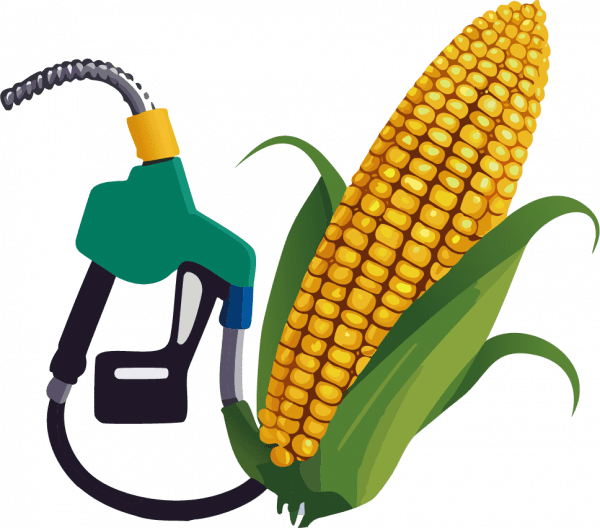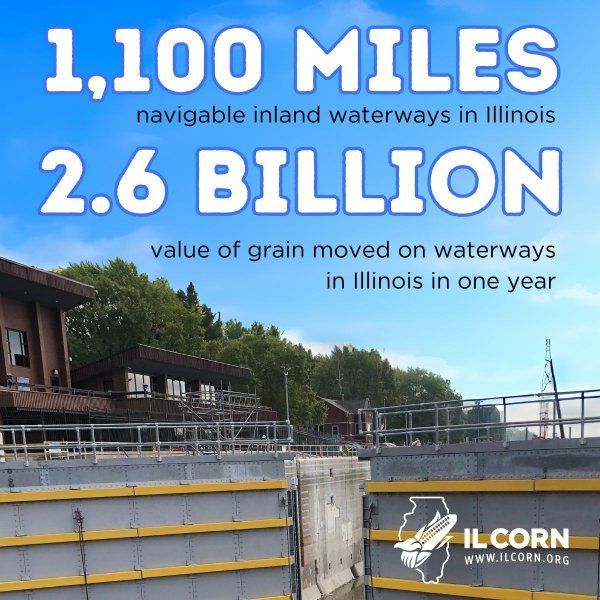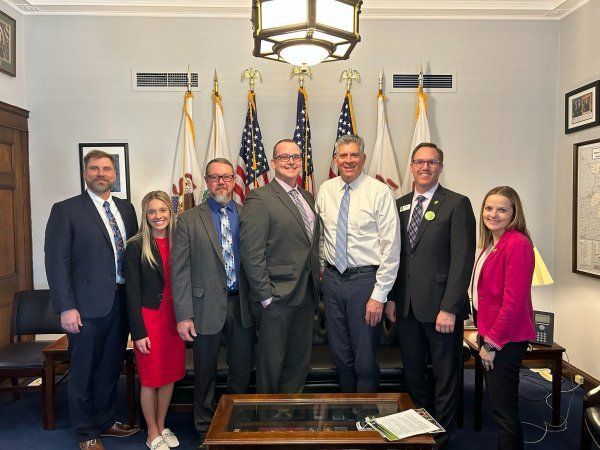Featured Article

March 29, 2024
IL Corn TV is gearing up for an exciting new season, set to premiere on April 1st on IL Corn's YouTube channel. This season promises a lineup of insightful interviews with experts from the agricultural industry and local farmers in Illinois. Whether you're deeply rooted in farming or simply intrigued by the world of agriculture, IL Corn TV's upcoming season is sure to catch your eye. One of the reasons why YouTube is such a crucial platform for IL Corn to focus on is its vast reach and accessibility. YouTube boasts billions of users worldwide, making it an ideal space to connect with a diverse audience.
March 28, 2024
Seeds are being sown to position Illinois as a hub for sustainable aviation fuel (SAF). On March 21-22, IL Corn and the Illinois Manufacturing Association hosted the inaugural Sustainable Aviation Fuel Conference in Lisle, Illinois. The event united stakeholders in the airline, policy, petroleum, transportation, ethanol, and agricultural sectors.

March 28, 2024
The U.S. Environmental Protection Agency finalized their Tailpipe Emissions Rule last week, making the rule even a bit more stringent than originally proposed. IL Corn joined several groups in submitting comments opposed to the proposed rule, which originally proposed that 67 percent of vehicle sales be battery electric vehicles by 2032, and now pushes that number to 69 percent. Understanding that a move away from liquid fuels could decimate the ethanol industry and corn demand, IL Corn responded with a full-page ad in the Chicago Tribune on March 24. The ad encouraged Congress to take advantage of corn-based ethanol to achieve our country’s climate goals and promoted the Next Generation Fuels Act as an opportunity to both achieve the greenhouse gas reduction goal and protect liquid fuels and internal combustion engines. Perhaps most notably for Congress, the Next Generation Fuels Act allows Americans to freedom to buy the vehicles they want to buy. The University of Nebraska-Lincoln published a study on July 5, 2023 as a response to the EPA’s proposed rule in which they found that the unintended consequences of a rule like this that moved our country away from liquid fuels could be the next 1980s-like farm crisis. Now that the Tailpipe Emissions Rule is final, there are only two choices: America is forced to buy battery electric vehicles OR we work together to pass the Next Generation Fuels Act. One decimates rural America. One builds it up.
March 21, 2024
Inaugural conference will discuss latest in scientific research, production, and logistics The Illinois Manufacturers’ Association (IMA), in partnership with Intersect Illinois and the IL Corn Growers Association, today launched the inaugural Sustainable Aviation Fuel Conference (SAF) to showcase the opportunity renewable fuel offers to lower emissions and transform manufacturing, transportation and agriculture sectors across the Midwest. Also sponsored by the University of Illinois Chicago, University of Illinois Urbana-Champaign, ADM and Marquis Sustainable Aviation Fuel, the two-day conference offers participants valuable industry insights, featuring speakers and presentations to address all aspects of SAF. Participants will learn from industry experts, federal and state agencies and public officials about the use of SAF and the new ecosystem being created for the industry. Governor JB Pritzker has been invited to deliver a keynote address and U.S. Sen. Tammy Duckworth will discuss Illinois’ bright future in the industry during a pre-recorded fireside chat moderated by John Atkinson, Chair of Intersect Illinois. Other speakers will cover topics ranging from the latest research to advance the science and deployment of SAF in Illinois to logistics of SAF transportation, testing, storage and fueling; carbon scoring and international export opportunities. A full schedule of events is here . “This inaugural event is bringing together key stakeholders in the industry to explore the unique opportunities this new initiative offers Illinois and the Midwest,” said Mark Denzler, President & CEO of the Illinois Manufacturers’ Association. “Sustainable aviation fuel could grow into the largest new market for U.S. and Illinois manufacturers have the opportunity to be at the forefront, creating jobs and taking the lead in efforts to reduce global carbon emissions.” “Illinois has the infrastructure, talent and resources needed for investors, producers, buyers and other stakeholders to make and distribute sustainable aviation fuel,” said Dan Seals, CEO of Intersect Illinois . “By bringing industry leaders together we are helping build Illinois’ dynamic sustainable aviation fuel ecosystem and positioning the state to lead the industry, which in turn will attract additional jobs and investment.” In 2023, Illinois passed a key incentive to support SAF, creating a $1.50 per gallon SAF purchase tax credit to support the supply and use of SAF within the state. Illinois will give airlines operating in the state the ability to claim credit for fuel purchased if the fuel achieves a reduction of at least 50% lifecycle greenhouse gas emissions when compared to petroleum jet fuel. “As a leader in biomanufacturing and aviation, Illinois is well-suited to lead the charge on sustainable aviation fuel adoption and manufacturing,” said Governor JB Pritzker. “The shift to SAF will no doubt play an important role in Illinois’ long-term climate goals, all while promoting innovation and creating jobs for our state.” “One of the most important things we can do to make American aviation more sustainable is increase the supply of American-grown, American-made sustainable aviation fuel,” said Senator Duckworth . “At the federal level, I’m committed to pushing for policies that expand the use of sustainable aviation fuels, grows the market for them, reduces our nation’s carbon footprint, transitions to a greener economy and supports our famers in Illinois and across the Midwest.” The renewable fuel industry presents immense opportunities for Illinois corn growers, who are well-positioned to help meet demands as the transportation sector seeks to cut carbon emissions. “U.S. corn production is growing at four times the rate of demand. Increasing investment in sustainable aviation fuel will drive up the demand for corn-based ethanol, presenting a unique opportunity for farmers across the state to help reduce gashouse emissions in the aviation industry,” said Chris Gould, Director, IL Corn Growers Association . “From feedstock such as corn grain, Illinois corn growers are ready to meet the needs of the industry.”

March 21, 2024
March is an important month in Washington. It’s the month that cherry blossoms bloom to the delight of city residents and tourists alike, and many outdoor activities, such as marathons, take off, shutting down city streets on the weekends. This month is also a time when congressional and administration officials begin to unveil their plans for the year ahead. We saw the beginnings of this on March 7, when President Biden gave his State of the Union speech. The president released his proposed federal budget for FY 2025 several days later, even as Congress and the administration are at an impasse on parts of this fiscal year’s budget. If the tone and tenor of the president’s address and the Republican response to that address are any indication of what we should expect in the year ahead, we should all fasten our seatbelts because it is going to be a bumpy ride. The president, who has trailed in polls against his opponent, former President Donald J. Trump, gave nothing short of a campaign-style speech designed to rally his base and win over independents. Conspicuously absent were the usual olive branches or allusions to working together. The speech was a reminder that we’re not just in an ordinary election year; we’re in an election year that will be unusually divisive. I have written at length in previous columns about how the divisions in this city are presenting all kinds of impediments to advancing legislation. We can expect those challenges to grow exponentially in 2024. This is a concern for farmers, who have numerous priorities before Congress, including farm bill reauthorization, passage of legislation ensuring year-round access to higher blends of ethanol during the summer months and advancement of the Next Generation Fuels Act. To penetrate all the noise in the air in Washington, corn advocates are using ingenuity. Just as the president and members of Congress are setting their agenda for the year ahead, we’re reminding these policymakers of our objectives for 2024. Here is a sampling of our activities: Meeting with Key Leaders. Numerous corn growers from states in the heartland have visited Washington to meet with their state’s delegations to emphasize corn grower priorities. NCGA board members, who will soon be in town for a scheduled meeting, also plan to meet with leaders in the administration and on Capitol Hill to drive home the importance of corn grower priorities. Launching Media Campaigns. To keep our messages front-and-center when we’re not meeting with key decision-makers, NCGA and state partners are running targeted ads in the D.C. metro area on important corn-centric issues. This includes the environmental and economic benefits of ethanol, our farm bill priorities and the innovative spirit of farmers and the role they play in environmental sustainability and the economy of rural America. Media campaigns like these round out a broader strategy to keep decision-makers engaged with corn grower priorities. Interacting with Congressional Candidates. Hopeful congress-bound candidates flock to D.C. to meet with stakeholders and interest groups to garner support ahead of their intended placement in an office on Capitol Hill. Because of our robust political action committee—Corn PAC—we have the resources to meet with potential partners and champions for our top priorities right here in the town they are striving to work in or stay in. This allows us to prime the pipes of policymaking to help ensure our members’ voices are heard and policy needs are met. While the next several months will be full of challenges, thanks to the fact that it is a particularly divisive election year, corn grower leaders continue to work hard to advance legislation that is important to rural economies. We will keep you posted on developments in these efforts. So, stay tuned! Here’s to March, spring and an election year full of twists and turns! Appleton is vice president of public policy at the National Corn Growers Association.

March 21, 2024
This week, lock and dam modernization projects on the Mississippi and Illinois rivers saw a $120 million allocation thanks to a bipartisan group of Illinois representatives and senators. Congressmen Budzinski, LaHood, and Sorensen and Senators Duckworth and Durbin requested funding for infrastructure upgrades and were able to bring funding back to our state. The lock and dam projects will provide the cleanest, most efficient opportunity for farmers to ship grain, as well as boost our local economies. This funding was secured through the Community Project Funding process , which allows members of Congress to designate funding for critical initiatives through the appropriations process. The $120 million secured was included in the FY2024 Energy and Water Development and Related Agencies appropriations bill that is now law. These upgrades support a decades-long initiative to strengthen infrastructure and restore ecosystems along the entire Upper Mississippi River System, known as the Navigation and Ecosystem Sustainability Program (NESP) . IL Corn is grateful to our partners in Congress as well as the Mid America Carpenters and the Waterways Council, Inc for their consistent promotion of the need for new locks and dams, as well as the jobs they provide for Illinois citizens.

March 20, 2024
BLOOMINGTON, Ill. – Upon reading the final EPA emissions standards for sedans and light-and medium-duty trucks, IL Corn Growers Association President Dave Rylander, a farmer from Victoria, IL, said the following: “This is a very disappointing day for Illinois corn farmers. The Environmental Protection Agency has picked their preferred technology for the transportation industry without regard to their published goal of lowering greenhouse gas emissions or how best to achieve the goal. “Their one-size-fits-all solution is for the entire nation to convert to battery electric vehicles, no matter if the infrastructure exists, no matter if the battery materials come from hostile countries, no matter if Americans want to buy these vehicles. Most important for Illinois corn farmers, they are also ignoring the impact on farmers and rural communities. “The University of Nebraska-Lincoln has already warned that this policy could have the unintended consequence of a 50 percent decrease in the price of corn and a potential $100 billion decline in the collective value of farmland in the Midwest. They predict if these forecasts come true, there will be profound implications for the financial viability of Midwestern farming operations and the nation’s food supply. “Corn-based ethanol can contribute to this very important goal of cleaning the air and reducing greenhouse gas emissions. Ethanol reduces GHG emissions by 40-45 percent over regular petroleum fuel, it invests in our local economies, and it allows Americans to buy the cars they want to buy. Corn farmers have been asking continuously over the last ten years for the opportunity to help decarbonize liquid fuels. Why is the Biden administration ignoring an easy opportunity to accomplish their goals AND invest in America?” ### About the IL Corn Growers Association IL Corn Growers Association is a state-based organization that represents the interests of corn farmers in Illinois, maintaining a high profile on issues in Washington, DC, and Springfield, IL. Through grassroots advocacy, ICGA creates a future for Illinois farmers in which they can operate freely, responsibly, and successfully. In order to fulfill this mission, the organization conducts governmental affairs activities at all levels, market development projects, and educational and member service programs. For further information regarding their work and involvement, visit their website www.ilcorn.org.

March 19, 2024
Sponsored by Sen. Bill Cunningham, D-Chicago, and Rep. Jay Hoffman, D-Swansea, the legislation builds upon existing federal incentives and regulations, recognizing the state’s distinctive geology provides a unique opportunity to work toward Illinois’ goal of reducing greenhouse gases while also increasing economic development. As other states compete for investments, Illinois must seize the opportunity to provide clear policies to allow for successful project development. IL Corn Growers Association members have been watching this conversation as projects are proposed around Illinois. Because our members are interested in the topic and wanted a seat at the table as the bill was being written, ICGA farmer leaders are an important part of this coalition and have helped to craft a narrowly focused bill that includes the best landowner protections of any existing bill in the country. “Illinois corn farmers have wanted us to engage on the subject to help ensure landowners are protected. The safeguards in the bill go further than other states,” said Matt Rush, a farmer from Fairfield and Past President of the IL Corn Growers Association. “This important technology will help the corn ethanol industry pursue domestic and international low carbon fuel markets, bolster investment in existing production facilities and better position the industry to develop market opportunities like sustainable aviation fuel.” CCS captures carbon dioxide (CO2) emissions at the source, preventing their release into the atmosphere and storing them permanently deep underground. According to the Clean Air Task Force, CCS is a safe and proven technology that has been commercially applied to operations in the U.S. since the 1970s. International studies addressing the energy transition suggest that CCS is a necessary tool for rapid decarbonization, along with energy efficiency and electrification. “This technology prevents greenhouse gas emissions from entering the atmosphere, which can improve air quality and help Illinois reach its clean energy targets,” said Dr. Sallie Greenberg, a leading carbon capture and storage scientist who led a mandated study report for the General Assembly about the potential of CCS to help the state meet its emissions goals. “Illinois is uniquely positioned to lead the way on carbon reduction efforts because of our exceptional geology which consists of rocks with both excellent storage potential and rocks that act as impermeable barriers to keep CO2 permanently stored more than a mile beneath the surface.” CCS is the technology that will allow corn-based ethanol a competitive opportunity in the fuel marketplace. Without the ability to sequester carbon, ethanol will not meet the GHG emissions reduction requirements to participate in sustainable aviation fuel production. CCS also empowers a lower carbon intensity score for ethanol that will help protect the biofuel’s role in a liquid fuel future.
Articles
2026
2025
2024
2023
2022
2021
2020

